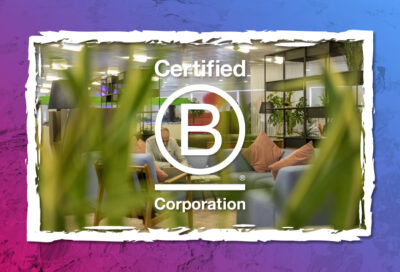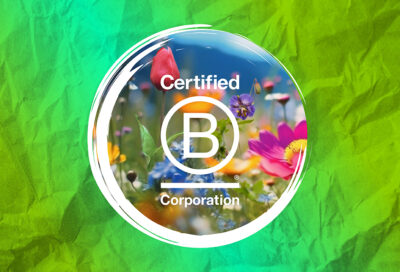With the world carefully reopening, Retail Rocks returned for 2021. It’s our annual event for retail business leaders, and this year, the headline act was the Retail Rumble – a collaborative, conference-style coming together of some of retail’s brightest minds.
Hosted by Cat Kelly, our Head of Retail, we were treated to insights galore from: James Sawley, Head of Retail & Leisure at HSBC; Udhi Silva, serial entrepreneur and co-founder of Snaffling Pig; and Luke Olly, Energy & Environment Manager at Central England Co-operative.
Throughout our chat, there was one topic in particular that sparked a lot of discussion in the audience, and that was sustainability. It’s a term we hear bandied about a lot, but in the context of your business, what does it actually mean? Why should you care? And how can you display your ESG efforts in a confident, credible manner?
WHAT IS SUSTAINABILITY? AND WHY SHOULD YOUR BUSINESS CARE?
With Co-op’s carbon neutral ambitions gathering pace, Luke was perfectly placed to use his 12 years’ experience in the environment industry to talk us through what sustainability is, and why it matters in your business’ success.
“Being sustainable means the actions that we take now won’t impact our future generations and their ability to make choices,” Luke told us. “Imagine your business is operating in a low carbon economy. Does your business fit comfortably in that space? Or is there another company that would fit better?
“The need to be sustainable is supercharging innovation. There are companies that are developing and rolling out solutions that are revolutionising the way we travel, produce energy, grow food, and of course, how we shop as well.
“Often, these solutions aren’t perfect, but they’re a lot better than what we have currently, and they’re after the inefficient incumbents who are lagging behind. That’s what the capitalist consumer economy is good at. So, we have to recognise that a better, more sustainable version of our products and services has the potential to exist. If we don’t develop it, someone else probably will, and the transition will happen very quickly when it does.”
Tesla’s meteoric rise is a case in point. The electric car, battery and clean energy company is now worth more than the nine largest carmakers combined. Sustainability isn’t a fad. It’s a huge opportunity to prepare, protect and power your business for the future.
With Luke’s help, Central England Co-op have set out to get ahead of the curve. They’ve reduced food waste by 40% in the last two years, they have a target to make all their plastics easily recyclable, and they’re investing heavily in reducing their gas, electricity and diesel consumption.
Since 2010, they’ve cut their carbon footprint by 76%. By 2030, they want that figure to be 90%, and they’ve included carbon reduction targets in their exec team’s bonuses to make sure they have sponsorship across the business, which Luke described as a “really important” step in their mission to “create a sustainable society for all”.
Here, Co-op’s success reinforces an important point: there’s no time like now to begin your own sustainability journey, and positive change is possible in even the largest, most established businesses.
SUSTAINABILITY REPORTING & ASSURANCE
Are you being transparent and accountable for your sustainability targets? How are you reporting them? And is there some kind of framework you can measure yourself against?
Sustainability reporting and assurance is something we’ve been supporting our clients with recently. For a more detailed look into what that entails, check out this blog, but for Luke and Co-op, it remains a powerful way to show intent, commitment and confidence in their ESG efforts:
“There are a number of things we’re doing,” he told us. “We work with The Carbon Trust to get ourselves audited every other year, demonstrating that we’re reducing our carbon, our waste and our water consumption. There’s energy and carbon reporting legislation too, which means we have to report on particular aspects of our environmental impact throughout the year in a consistent manner, using greenhouse gas protocols.”
At Cooper Parry, we’ve witnessed first-hand the sheer volume of different frameworks out there through our sustainability reporting and assurance work; Cat even likened them to ‘swimming badges’, because with so many out there, which ones matter?
“There’s a lot of good stuff out there,” Luke told us. “But that can sometimes lead to consumers not necessarily understanding which stamp you’ve been stamped with. We’re very transparent as a business and we use the Global Reporting Initiative (GRI) as a standard for what we do.
“There are a lot of industry specific ones too, relating to banking for example, or retail. It can be difficult to choose, but because there’s a significant amount of greenwashing out there – something the UK government are looking to clamp down on – it’s important we’re demonstrating what we do credibly, otherwise it undermines the whole thing.”
When it comes to making elements like your electricity reporting and reductions easier, Luke suggests having one supplier – an approach that’s worked well at Co-op:
“That’s definitely #1 on my list of things to do. You need to have one supplier with all the information you need at your fingertips, because you can spend a lot of time wrestling with data, and it doesn’t really get you anywhere until you’ve got that data in a great place and it tells you something.
“We were going through that wrestling process with our water. Water was deregulated a few years ago and there’s still a long way to go on that one, but with gas and electricity, you want to have good data that you can report on easily. You don’t need to report on it to everybody, but you need to be able to provide actionable insights.”
CARBON NEUTRAL, NET-ZERO CARBON. WHAT’S THE DIFFERENCE?
Often, ‘carbon neutral’ and ‘net-zero carbon’ are used interchangeably, but in reality, they represent very different approaches to combatting climate change.
Carbon neutral refers to offsetting (removing) enough carbon from the atmosphere to balance out the amount you’re producing. A lot of the time, brands achieve this through initiatives like planting trees.
Net-zero carbon, as Luke told us, is yet to be properly defined, with Science Based Targets expected to bring out a full standard later this year. The emphasis will be on carbon reduction, as opposed to offsetting, and Luke predicts reaching net-zero carbon will be “bloody hard.”
“The whole tree planting concept, while being beneficial for many reasons, will not get you to net-zero carbon,” he said. “If we all went away and planted a lot of trees, we would not solve climate change. So, we should focus our attention on that first. The tree planting will come in due course, but we need to stop burning fossil fuels.”
DO WE HAVE TIME?
“It’s a change in mindset that’s going to take generations to turn the tables,” James Sawley shared. “The question is: do we have time? I recently read a book called ‘The Green Grocer’ by Richard Walker; I recommend it highly, he’s an amazing thought leader (cue Luke holding up his own copy to the camera).
“The really interesting thing that hit me was the fundamental conflicts between Environmental, Social and Governance in ESG. Every single penny that the government can use ultimately comes from businesses, so the private sector is an essential part of this agenda.
“He uses an example about putting doors on our freezers to reduce energy consumption, but we’ve tested that. If we put doors on the freezers, sales reduce by 10%, we don’t have a business, we can’t make a profit, and then, we can’t employ thousands of people in some of our poorest communities.
“It’s about getting that balance right between E, S and G. It has to start with the consumer and people choosing to shop sustainably. But Richard makes the other very good point that environmentalism needs to be democratized and made mass market.
“It’s all well and good me buying a Patagonia jumper, because I’m fortunate enough to be able to buy it. But we need business to drive the innovation to make environmental choices accessible to everyone.”
“That’s completely right, James,” added Luke. “And that’s the exciting point of time we’re in. When I first started in the environmental industry, I worked for a charity where we were trying to raise peoples’ awareness of the problems and the solutions that are out there, but all the solutions were far too expensive. It was really difficult to get people on board.
“Now, we’ve seen a massive transition in the technologies available. Renewable energy technology is right at the forefront and ahead of the curve. We’ve got electric vehicles coming through strongly, and we’ve got new types of food creation which are going to be massively exciting in the future.
“These are all solutions that are coming down the line, and they’re all very credible. They’ll deliver savings and better products to the consumer, so, the choice is a simple one. And then, when we have that sort of situation, we’ll be able to see positive change happening really quickly.”























